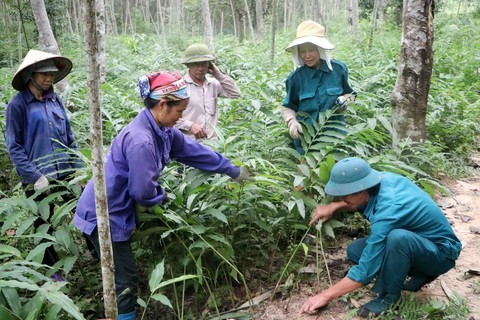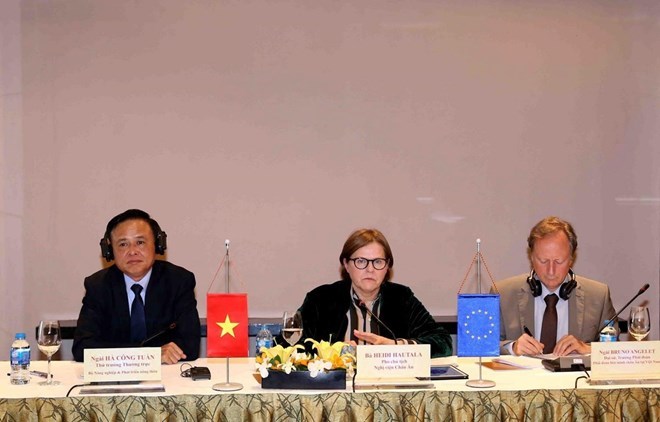 |
| Farmers in the northern province of Lai Chau check on trees in a local forest. Viet Nam needs to develop a timber legality assurance system to ensure its exports of timber and timber products come from legal sources. |
The Delegation of the EU to Viet Nam and Viet Nam Ministry of Agriculture and Rural Development yesterday announced the completion of the process of approval and ratification of VPA/FLECT.
According to Nguyen Quoc Tri, Director of the Viet Nam Administration of Forestry, the implementation of the VPA/FLECT marked the beginning of a joint commitment of the EU and Viet Nam to work together to address illegal logging and associated trade.
To implement the VPA/ FLEGT, Viet Nam would develop a timber legality assurance system (VNTLAS) to ensure that its exports of timber and timber products come from legal sources, including systems to verify that Vietnamese businesses were only importing timber that had been legally harvested and traded in accordance with the relevant legislation in the country of harvest.
This meant that illegally harvested timber, as well as those businesses trading with it, would not be a part of supply chains regulated by the timber legality assurance system that Viet Nam was putting in place.
To implement the agreement, Viet Nam was to continue to adopt new legislation in order to harmonise the agreements commitments, including the preparation of a decree on the VNTLAS which was expected to be promulgated by the end of 2019.
The two sides also agreed to establish a joint implementation committee (JIC) to oversee how the provisions of the agreement were put into practice. JIC would also facilitate dialogue and exchange of information between the both sides.
The agreement was fully implemented when the FLEGT licensing scheme started.
 |
At that time, each shipment of timber and timber products from Viet Nam exported to the EU would be accompanied by a FLEGT license. FLEGT licensing would provide certainty of meeting the requirements of the EU Timber Regulation, which prohibited the placing of illegal timber on the EU market.
Ha Cong Tuan, Deputy Minister of Agriculture and Rural Development, in addition to the variety of social, economic and environmental benefits associated with better management of the forestry sector in Viet Nam, FLEGT licensing would contribute to increase the credibility of Viet Nams timber processing industry not only in the EU but also in other export markets, which were increasingly in demand for legal timber.
“The VPA/FLECT sends a strong signal on Viet Nam's and the EU's commitment towards front loading the implementation of the 'Trade and Sustainable Development' Chapter of the EVFTA, which includes provisions on sustainable forest management and trade in forest products,” Tuan said.
According to head of the EU Delegation to Viet Nam Ambassador Bruno Angelet, Viet Nam was the second country in Asia signed VPA/FLECT with the EU, after Indonesia.
He said that Viet Nams export of timber products to the EU was expected to see strong growth when the agreement entered into force, adding that the EU would continue to provide supports to Viet Nam in developing VNTLAS and FLECT licensing.
The both sides launched the VPA/FLEGT negotiation in October 2010 and started the negotiation process from November 2011. Over more than six years, on 19 October 2018, in Brussels, the agreement was signed.
Viet Nam was exporting timber products to 120 countries and territories, including major markets such as the EU, the US, Japan, China, South Korea and Australia.
In 2018, Viet Nams export of wood and timber products reached a record value of US$9.3 billion, $900 million of which was to the EU markets. — VNS
 Starting from June 1, Viet Nam could export only verified legal timber products to the EU markets as the Voluntary Partnership Agreement on Forest Law Enforcement, Governance and Trade (VPA/FLECT) would officially enter into force.
Starting from June 1, Viet Nam could export only verified legal timber products to the EU markets as the Voluntary Partnership Agreement on Forest Law Enforcement, Governance and Trade (VPA/FLECT) would officially enter into force.